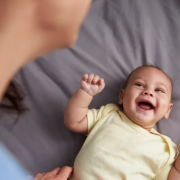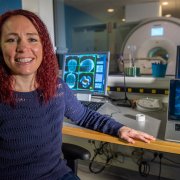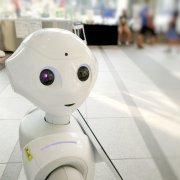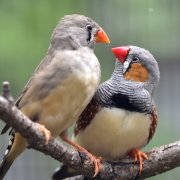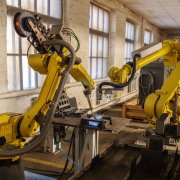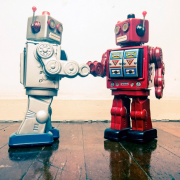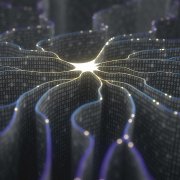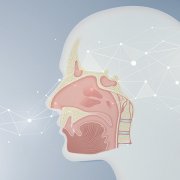November 15, 2021 - 4:15 pm
By Dana G. Smith
What does your infant see when they look at you? Do you appear as just a round blob with some dark features? Or can your child already recognize that they are looking at a face, one belonging to the parent who will love and protect them?
Scientists, philosophers—and parents—have asked similar questions about what is innate and what is learned in the infant brain, going all the way back to the ancients. A study conducted using an...
November 15, 2021 - 11:00 am
Study suggests this area of the visual cortex emerges much earlier in development than previously thought.
Anne Trafton | MIT News Office
Within the visual cortex of the adult brain, a small region is specialized to respond to faces, while nearby regions show strong preferences for bodies or for scenes such as landscapes.
Neuroscientists have long hypothesized that it takes many years of visual experience for these areas to develop in children...
November 11, 2021 - 10:45 am
MIT researchers have incorporated social interactions into a framework for robotics, allowing robots to understand what helps or hinders one another.
The robots have been primed to learn social behaviors on their own.
This could help create a more caring environment when robots are working in certain sectors such as health and social care.
Scientists are currently working on making robots' social interactions with humans even more...
November 9, 2021 - 9:00 am
This seminar talk will be hosted remotely via Zoom.
Andrea E. Martin, Lise Meitner Group Leader, Max-Planck Institute for Psycholinguistics
Research website:...
This seminar talk will be hosted remotely via Zoom; no in-person attendance.
Hosted by: Sam Gershman
Abstract: Human language is a fundamental biological signal with computational properties that are markedly different than in other perception-action systems: hierarchical relationships between...
Hosted by: Sam Gershman
Abstract: Human language is a fundamental biological signal with computational properties that are markedly different than in other perception-action systems: hierarchical relationships between...
November 8, 2021 - 4:30 pm
MIT researchers are seeking to revolutionize AI technology by reproducing a vital component of the neural circuitry of the zebra finch
by Steve Nadis
One month after being hatched, male zebra finches start learning to sing by imitating the songs of their fathers. Practicing thousands of times a day, young finches master these songs in a few months so they can eventually pass on the classics—sometimes used in courting rituals—to the next...
November 8, 2021 - 4:00 pm
A new machine-learning system helps robots understand and perform certain social interactions.
Adam Zewe | MIT News Office
Robots can deliver food on a college campus and hit a hole-in-one on the golf course, but even the most sophisticated robot can’t perform basic social interactions that are critical to everyday human life.
MIT researchers have now incorporated certain social interactions into a framework for robotics, enabling machines to...
November 5, 2021 - 4:30 pm
Politeness doesn’t really amount to much when you’re programmed to get from point A to point B. But if robots are going to play an increased role in human society, questions arise around how precisely they’ll get along with the rest of us.
“Robots will live in our world soon enough and they really need to learn how to communicate with us on human terms,” MIT CSAIL research scientist Boris Katz said in a statement tied to a new research paper. “...
November 5, 2021 - 4:00 pm
Neuroscientists find the internal workings of next-word prediction models resemble those of language-processing centers in the brain
In the past few years, artificial intelligence models of language have become very good at certain tasks. Most notably, they excel at predicting the next word in a string of text; this technology helps search engines and texting apps predict the next word you are going to type.
The most recent generation of...
November 4, 2021 - 4:00 pm
A new machine-learning system helps robots understand and perform certain social interactions.
Robots can deliver food on a college campus and hit a hole in one on the golf course, but even the most sophisticated robot can’t perform basic social interactions that are critical to everyday human life.
MIT researchers have now incorporated certain social interactions into a framework for robotics, enabling machines to understand what it means to...
November 4, 2021 - 10:00 am
Ballyhooed artificial intelligence technology, known as “deep learning,” brings back ideas 70 years ago.
Over the last decade, the best performing artificial intelligence systems, such as smartphone voice recognition and Google’s latest automatic translation capabilities, have come from a technique called “deep learning.”
Deep learning is, in fact, a new name for an approach to artificial intelligence called neural networks. Neural networks have...
November 2, 2021 - 4:00 pm
Vivian Paulun
Title: Wobbling, drooping, bouncing—Visual perception of materials and their properties
Abstract: Visual inference of material properties like mass, compliance, elasticity or fragility is crucial to predicting and interacting with our environment. Yet, it is unclear how the brain achieves...
Abstract: Visual inference of material properties like mass, compliance, elasticity or fragility is crucial to predicting and interacting with our environment. Yet, it is unclear how the brain achieves...
October 26, 2021 - 4:00 pm
MIBR Seminar Room 46-3189
Drs. Jie Zheng and Mengmi Zhang
Please note, Dr. Zhang will be presenting remotely via Zoom.
Abstract:
Jie Zheng's presentation:
Title: Neurons that structure memories of ordered experience in human
Abstract: The process of constructing temporal associations among related events is essential to episodic memory. However, what neural mechanism helps accomplish this function remains unclear...
Jie Zheng's presentation:
Title: Neurons that structure memories of ordered experience in human
Abstract: The process of constructing temporal associations among related events is essential to episodic memory. However, what neural mechanism helps accomplish this function remains unclear...
October 25, 2021 - 3:00 pm
Neuroscientists find the internal workings of next-word prediction models resemble those of language-processing centers in the brain.
Anne Trafton | MIT News Office
In the past few years, artificial intelligence models of language have become very good at certain tasks. Most notably, they excel at predicting the next word in a string of text; this technology helps search engines and texting apps predict the next word you are going to type.
The...
October 19, 2021 - 4:00 pm
Trenton Bricken and Will Xiao, Kreiman Lab
Will Xiao's presentation
Title: What you see is what IT gets: Responses in primate visual cortex during natural viewing
Abstract: How does the brain support our ability to see? Studies of primate vision have typically focused on controlled viewing conditions exemplified by the rapid serial visual...
Title: What you see is what IT gets: Responses in primate visual cortex during natural viewing
Abstract: How does the brain support our ability to see? Studies of primate vision have typically focused on controlled viewing conditions exemplified by the rapid serial visual...
October 18, 2021 - 5:00 pm
When asked to classify odors, artificial neural networks adopt a structure that closely resembles that of the brain’s olfactory circuitry.
by Jennifer Michalowski | McGovern Institute for Brain Research
Using machine learning, a computer model can teach itself to smell in just a few minutes. When it does, researchers have found, it builds a neural network that closely mimics the olfactory circuits that animal brains use to process odors.
Animals...

